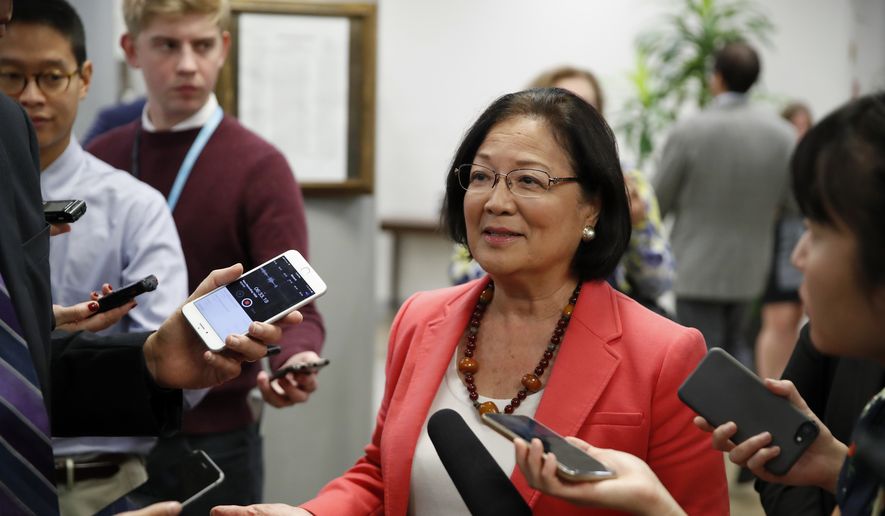As her colleagues watched in silence,
同僚們靜靜地看著她,
Hirono described being born at home in rural Japan,
慶子講述起自己出生于日本農村,
her sister’s death from pneumonia because the family didn’t have access to hospitals and a childhood spent living paycheck to paycheck.
因為家人沒有就醫的門路,姐姐被肺炎奪去了生命,小時候一家人只能勉強糊口的那段經歷。
She then turned to the present.
接著她話鋒一轉,談到了當下。
“I am fighting kidney cancer,” she said.
“我正在與腎癌作斗爭,”她說。
“And I’m just so grateful that I had health insurance so that I could concentrate on the care that I needed
“我很感激我有醫保,這樣我就可以專注于我需要的治療,
rather than how the heck I was going to afford the care that was going to probably save my life.”
而不是為我該如何支付那還不一定能救我命的治療產生的費用發愁。”
Some pundits suggested Hirono had “found her voice” or was “stepping out of the shadows,”
一些評論人士不是說慶子已經“找到了自己的聲音”,就是說她“正在走出陰影”,
both constructs the Senator finds grating and a tad sexist.
兩種說法都讓這位參議員感到有些不快,還覺得有點性別歧視。
After all, what man ever lacked a voice?
畢竟,男人何時缺失過聲音呢?
“I had run other people’s campaigns.
“我負責過別人的競選活動。
I had been doing political activities for a decade before I ever ran for office myself,” she says now.
在我自己競選公職之前,我就已經有10年的從政經驗了,”她說道。
“That is so much the experience of women of my generation.
“這就是我們這一代女性經歷的真實寫照。
We always feel as though we have to bring so much more to the table, and that never stops the guys.”
我們總是覺得,好像我們必須拿出多得多的本事,結果還是沒有阻止那些男人歧視我們。”
But Hirono is careful to ground her decisions in reality, including those about her health.
但慶子真正做決定的時候,包括做有關她的健康的決定的時候都很謹慎。

“The first question I asked my doctor, when he told me of my diagnosis was,
“醫生告訴我診斷結果時,我問的第一個問題就是,
‘Am I going to die anytime soon?’ He said no,” she remembers.
‘我是不是活不長了?他說不是,”她回憶道。
“O.K., let’s talk about what kind of treatment I’m going to have,” was her reply.
她的回答是:“那好,那我們來談談接下來怎么治吧。”
Doctors removed her right kidney and part of her seventh rib, where the cancer had spread.
醫生切除了她的右腎以及第七根肋骨的一部分,因為癌細胞已經擴散到了那里。
She is in ongoing immunotherapy treatment.
她還在繼續接受免疫治療。
She gets infusions every three weeks and says she expects to be in treatment for the long haul.
每三周就要接受一次注射,她說她希望治療的時間能長一點。
Hirono is running for a second term on this November’s ballot.
慶子還準備在今年11月選舉時競選連任。
She is popular enough in Hawaii that she hasn’t drawn a Democratic primary challenge, and the GOP does not fare well in the islands.
她在夏威夷很受歡迎,在民主黨初選階段沒有遭遇挑戰,而共和黨在夏威夷并不太受歡迎。
Republicans in Washington are not planning to waste their money trying to boost a challenger.
華盛頓的共和黨人不打算浪費他們的錢來支持一位挑戰者。
“I’m plugging away, not fading away,” Hirono says.
“我是在埋頭苦干,并不是退場了,”慶子說道。
If Trump’s presidency has renewed her sense of purpose, it has not instilled a love for political combat.
如果說特朗普的當選重新喚起了她的使命感,那也沒能在她身上培養出對政治斗爭的熱愛。
“I never refer to what I do as my career.
“我從不把我所做的事當作我的事業。
What kind of career is it that you have to run for office every two years and go out there and ask total strangers to support you?” she asks.
每兩年就要參加一次競選,就要到大街上請求你完全都不認識的人支持你,這種工作算哪門子事業?”她問道。
“It’s what I do. It’s my service.”
“這只是我的工作,我只是在服務。”
So why not retire?
那為什么不退休呢?
“One person can make a difference,” Hirono says. “My mom changed my life by bringing me to this country.”
“一個人也能改變世界,”慶子說:“是我媽媽把我帶到這個國家,改變了我的人生。”
Plus, she says, the President needs a counterbalance.
此外,她說,總統需要人來制衡。
“The battles that we win,” she says, “never stay won.”
“我們是打贏了那些戰爭,”她說,“但勝利并不會長久。”
譯文由可可原創,僅供學習交流使用,未經許可請勿轉載。


